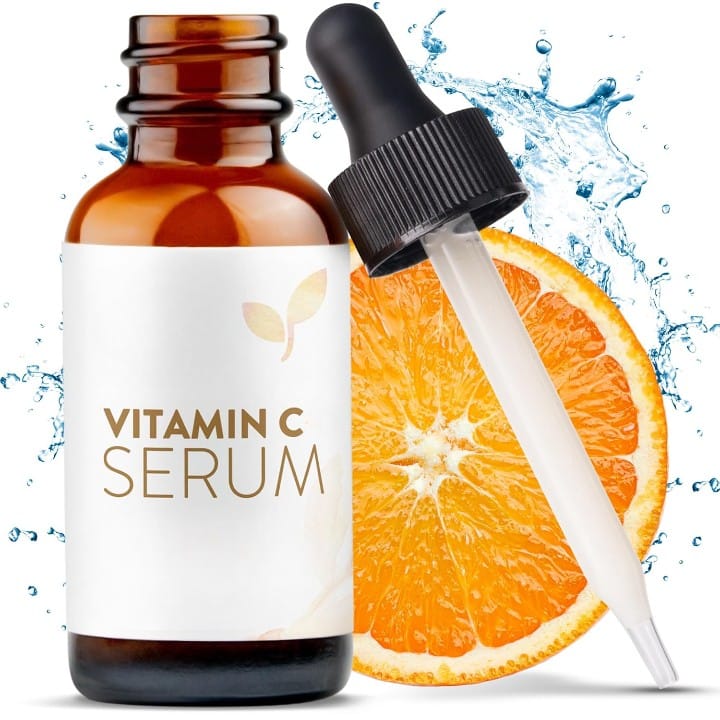Key Takeaways:
- Learn the correct application method for vitamin C serum to maximize skin health benefits.
- Discover how to pair vitamin C with other skincare ingredients for enhanced results.
- Understand the importance of storage and shelf life to maintain the efficacy of vitamin C serums.
Vitamin C serum is a powerhouse skincare product that has gained immense popularity for its ability to brighten skin, boost collagen production, and protect against environmental damage. However, to reap the full benefits of this potent antioxidant, it's essential to understand how to use vitamin C serum correctly. This comprehensive guide will provide you with professional insights into incorporating vitamin C serum into your skincare routine effectively.
Understanding Vitamin C Serum
Vitamin C serum is a topical skincare product that contains a high concentration of vitamin C, an antioxidant that helps protect the skin from damage caused by UV rays and pollution. The serum form allows for deeper penetration into the skin, making it more effective than other forms of vitamin C products. L ascorbic acid is the most common and potent form of vitamin C used in serums, known for improving skin texture and tone.
The Benefits of Topical Vitamin C
Applying vitamin C serum to the skin can lead to numerous benefits. It helps to neutralize free radicals, reducing the risk of inflammation and redness. Vitamin C serum benefits also include promoting collagen production, which is vital for maintaining healthy skin and reducing the appearance of wrinkles. Additionally, it can help fade dark spots and acne scars, contributing to a more even skin tone.
Selecting the Right Vitamin C Serum
When choosing a good vitamin C serum, consider the concentration of active ingredients. Serums with a combination of vitamin C, vitamin E, and ferulic acid are particularly effective, as they work synergistically to enhance the antioxidant effects. For sensitive skin, look for serums with a lower concentration of L ascorbic acid or those formulated with magnesium ascorbyl phosphate, a less irritating form of vitamin C.
Vitamin C Serum for Different Skin Types
Vitamin C serums are suitable for various skin types, but it's crucial to select a product that aligns with your specific skin needs. For oily or acne-prone skin, opt for a serum that absorbs quickly and contains additional acne-fighting ingredients. Those with dry skin should look for serums with hyaluronic acid, which provides extra hydration.
How to Apply Vitamin C Serum
To apply vitamin C serum, start with a clean face. Use a gentle cleanser to remove any impurities, ensuring that the serum can penetrate effectively. After cleansing, pat your skin dry and apply a few drops of the serum to your face and neck, avoiding the eye area. Gently massage the serum into your skin until it's fully absorbed.
Incorporating Vitamin C into Your Skincare Routine
Vitamin C serum should be used as part of your morning skincare routine. After applying the serum, wait a few minutes to allow it to absorb before moving on to the next steps. Follow up with a moisturizer to lock in hydration and, most importantly, sunscreen to protect against sun exposure. Vitamin C can enhance sun protection but is not a substitute for sunscreen.
Pairing Vitamin C with Other Skincare Ingredients
Pairing vitamin C with other skincare products can boost its efficacy. For example, using vitamin C with a retinol product in the same routine can provide anti-aging and skin-brightening benefits. However, be cautious and introduce new combinations slowly to avoid skin irritation. Always perform a patch test when trying out new skincare products.
Vitamin C Serum as an Anti-Aging Solution
Vitamin C serum is not just a popular ingredient in skin care products; it's a powerhouse when it comes to anti-aging benefits. Its antioxidant properties help to neutralize free radicals, which are unstable molecules that can damage cells and accelerate aging. By incorporating a vitamin C serum into your skin care routine, you can help to reduce the appearance of fine lines and wrinkles, promoting a more youthful complexion. This is due to the serum's ability to stimulate collagen production, a vital protein that gives skin its elasticity and firmness.
Moreover, vitamin C's role in anti-aging extends beyond its collagen-boosting capabilities. It also helps to even out skin tone and diminish the appearance of age spots. Regular use of a vitamin C serum can lead to brighter, smoother, and more resilient skin. It makes sense to choose a water-soluble product, ensuring better absorption and effectiveness. When selecting an anti-aging serum, look for formulations that contain a stable form of vitamin C to ensure that you reap all the anti-aging benefits over time.
Vitamin C Serum and Collagen Production
Vitamin C serum is renowned for its anti-aging properties, largely due to its role in collagen synthesis. Collagen is a vital protein that provides structure and elasticity to the skin, which is essential for a youthful appearance. As we grow older, the natural production of collagen in our bodies diminishes, resulting in the development of wrinkles and fine lines.
By stimulating collagen production, vitamin C serum can help to maintain firm, smooth, and youthful-looking skin. Studies have shown that the topical application of vitamin C increases collagen production in both young and aged human skin.
Furthermore, the antioxidant properties of vitamin C serum protect the skin's existing collagen from damage caused by free radicals and environmental stressors like UV radiation and pollution. This dual action of promoting collagen production and protecting it from breakdown makes vitamin C serum a cornerstone in anti-aging skincare regimens. Regular use of a well-formulated serum can visibly reduce the signs of aging and improve the overall texture of the skin, making it a favorite among dermatologists and skincare enthusiasts alike.
The Role of Vitamin C Serum in Skin Repair and Protection
Vitamin C serum not only combats the visible signs of aging but also plays a crucial role in the skin's natural repair process. Damage from sun exposure, environmental pollutants, and lifestyle factors can lead to oxidative stress, which accelerates the aging process and can cause hyperpigmentation, dullness, and a loss of tone. Vitamin C's antioxidant properties help to neutralize these harmful free radicals, aiding in the skin's ability to repair itself and prevent further damage.
In addition to its reparative benefits, vitamin C serum also offers protection. It enhances the skin's natural defense system against UV-induced photodamage when used in conjunction with a broad-spectrum sunscreen. This is particularly important as UV exposure is one of the leading causes of premature aging.
By reinforcing the skin's defense mechanisms, vitamin C serum not only helps to prevent the formation of fine lines and wrinkles but also supports the maintenance of a more even and radiant complexion. Regular application of vitamin C serum can result in healthier, more resilient skin that is better equipped to withstand the rigors of daily environmental exposure.
Addressing Skin Sensitivity and Allergic Reactions
While vitamin C serums are generally well-tolerated, some individuals may experience an allergic reaction or skin sensitivity, particularly if they have sensitive skin or are new to using high concentrations of vitamins in their skin care routine. It's crucial to perform a patch test before fully integrating a new vitamin C serum into your regimen. To ensure your safety, it is recommended to perform a patch test before using the product. Simply apply a small amount to an inconspicuous area of the skin and wait for 24 hours. This will enable you to observe any possible adverse reactions, such as redness, itching, or swelling.
If an allergic reaction occurs, cease use promptly and seek advice from a dermatologist. Individuals with sensitive skin may begin with a lower concentration of vitamin C and gradually escalate as their skin develops tolerance.
Additionally, look for serums that are specifically formulated for sensitive skin, which often contain soothing ingredients alongside vitamin C to minimize potential irritation. Remember, the goal is to enhance your skincare routine, not to compromise your skin's health, so always listen to your skin's needs.
Avoiding Potential Side Effects
While vitamin C serums are generally safe, potential side effects like skin irritation or allergic reactions can occur, especially in those with sensitive skin. To minimize the risk, start with a lower concentration of vitamin C and gradually increase it. If you experience redness or discomfort, discontinue use and consult a dermatologist.
The Importance of Serum Shelf Life
The shelf life of vitamin C serums is crucial as the ingredient is prone to oxidation. Look for serums packaged in dark or opaque bottles to protect from light exposure. Ensure the cap is tightly sealed after each use to prevent air from degrading the serum. Replace your vitamin C serum every 3-6 months to ensure you're using a potent product.
Storing Your Vitamin C Serum Correctly
Proper storage is key to maintaining the effectiveness of your vitamin C serum. Keep it in a cool, dark place away from direct sunlight and heat. Some people prefer to store their serums in the refrigerator to prolong their shelf life. However, always check the product's storage recommendations as provided by the manufacturer.
Vitamin C Serum and Sun Exposure
While vitamin C serum helps protect against damage from UV rays, it is not a substitute for sunscreen. Always apply a broad-spectrum sunscreen with an SPF of 30 or higher after your vitamin C serum has been absorbed into the skin. This combination offers a robust defense against sunburn and long-term sun damage.
Maximizing the Benefits of Vitamin C Serum
To maximize the benefits of your vitamin C serum, consistency is key. Use it daily as part of your morning skincare routine, and be patient, as it may take several weeks to notice significant improvements in skin tone and texture. Remember that skincare is a long-term commitment, and the results will come with regular use.
Combining Vitamin C Serum with Other Antioxidants
Combining vitamin C serum with other antioxidants like vitamin E and ferulic acid can provide a comprehensive shield against environmental stressors like pollution and cigarette smoke. These combinations work together to enhance the overall protective effects on the skin, leading to a healthier complexion.
Vitamin C Serum for Targeted Skin Concerns
Vitamin C serum is not only beneficial for overall skin health but can also target specific concerns such as dark circles, wrinkles, and loss of firmness. By promoting wound healing and collagen production, vitamin C serums can help to visibly improve these issues over time, leading to a more youthful and radiant appearance.

Can vitamin C serum be used on sensitive skin?
Certainly, vitamin C serum can be applied to sensitive skin. However, it is crucial to select a serum with an appropriate concentration and formulation. Begin with a lower concentration, and conduct a patch test before applying it to your entire face. This ensures optimal results while safeguarding the well-being of your skin.
How often should I apply vitamin C serum?
For optimal skincare, it is advisable to use vitamin C serum once daily, preferably in the morning. Vitamin C, a potent antioxidant, shields the skin against environmental damage and free radicals. Applying it in the morning ensures day-long protection for your skin.
However, if you have sensitive skin, it is best to start with every other day and gradually increase to daily use. It is also important to note that vitamin C serum can oxidize quickly, so it is best to store it in a cool, dark place and use it within 3 months of opening.
Can I use vitamin C serum with other active ingredients like retinol?
Yes, vitamin C can be used with other active ingredients like retinol, but it's important to introduce them slowly and monitor your skin for any signs of irritation. It's often recommended to use vitamin C in the morning and retinol at night.
What does vitamin C serum do to the face?
Vitamin C serum provides several benefits for the skin. It's safe for most skin types and is known for its hydrating properties. It brightens the skin, helps reduce redness, and evens out skin tone. Moreover, it stimulates collagen synthesis and wound healing and assists in antioxidant protection against UV-induced photodamage.
Is vitamin C serum good every day?
While not explicitly stated in the sources provided, most skincare experts recommend using Vitamin C serum daily for optimal results. However, individual skin types should be considered and it's always best to follow the instructions on the product packaging.
Which Vit C serum is best?
The best Vit C serum for you will depend on your specific skin type and concerns. It's important to look for a serum that contains a stable form of Vitamin C, such as L-ascorbic acid, as this is the most effective form for skin absorption. Additionally, look for serums that also contain other beneficial ingredients like Vitamin E, hyaluronic acid, and ferulic acid to enhance the benefits of Vitamin C.
It's also important to choose a serum with a concentration of at least 10-20% Vitamin C for maximum effectiveness. Ultimately, it's best to consult with a skincare professional to determine the best Vit C serum for your individual needs.
Is vitamin C good for skin lightening?
Indeed, vitamin C is renowned for its remarkable ability to brighten the skin. By enhancing radiance and promoting a more balanced complexion, it works wonders for achieving a luminous glow.
Can vitamin C serum remove dark spots?
Yes, vitamin C serum is effective in reducing the appearance of dark spots on the skin. Vitamin C is a powerful antioxidant that helps to brighten and even out skin tone by inhibiting the production of melanin, the pigment responsible for dark spots. It also helps to promote collagen production, which can improve the overall texture and appearance of the skin.
However, results may vary depending on the severity of the dark spots and individual skin type. It is important to use a high-quality vitamin C serum and to consistently apply it as directed for best results.
Which is the best serum for skin whitening?
The sources provided do not specify a particular serum as the best for skin whitening. It's recommended to look for serums that contain ingredients known for their skin-brightening properties, such as Vitamin C.
Can I use vitamin C without moisturizer?
While it is not recommended to use vitamin C without a moisturizer, it ultimately depends on your skin type and the specific vitamin C product you are using. Vitamin C is a powerful antioxidant that can help brighten and even out skin tone, but it can also be drying and irritating if used alone.
A moisturizer helps to hydrate and protect the skin, creating a barrier between vitamin C and your skin. It is best to consult with a dermatologist or do a patch test before using vitamin C without a moisturizer to avoid any potential negative effects on your skin.
How to apply vitamin C on the face?
To apply vitamin C on the face, start by washing your face with a gentle cleanser and patting it dry. Then, take a small amount of vitamin C serum or cream and apply it evenly onto your face, avoiding the eye area. Gently massage the product into your skin using circular motions, making sure to cover your entire face.
Allow the vitamin C to fully absorb into your skin before applying any other products. It is recommended to use vitamin C in the morning before applying sunscreen and makeup. Remember to always patch-test any new product before applying it to your entire face.
What happens if I use vitamin C without sunscreen?
Vitamin C does provide some protection against UV-induced photodamage, but it should not replace sunscreen. For optimal protection, it's recommended to use Vitamin C serum in conjunction with a broad-spectrum sunscreen.
Why is vitamin C serum so expensive?
The price of Vitamin C serum can vary depending on several factors, including the quality and concentration of the ingredients, the brand, and the research and development costs associated with creating the product. High-quality Vitamin C serums are often more expensive due to the cost involved in ensuring the stability and effectiveness of the Vitamin C.

Vitamin C serum is a versatile and effective addition to any skincare routine, offering a range of benefits from brightening the complexion to protecting against environmental damage. By selecting the right serum for your skin type, applying it correctly, and pairing it with complementary skincare products, you can maximize its benefits and achieve healthier, more radiant skin. Remember to pay attention to the serum's shelf life and storage to ensure its efficacy, and always follow up with sunscreen to protect your skin from UV rays.













